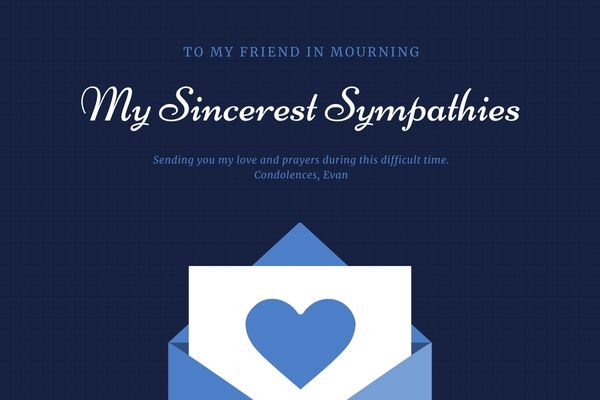When someone you love has passed by, it can be very difficult to find the right words of sympathy to say. You mourn your suffering, but you also realize that his family is going through a lot of torment.
The sentences of encouragement that you have to convey may seem incomplete. Whatever the case, it’s important to convey your sympathy to your soulmate or loved one.
Show them that you care about what they are experiencing. Words of sympathy can linger in the mind of a survivor long after the initial pain of despair starts to fade.
Tips To Find the Right Words of Sympathy

#1. Seek Help
If you really want to write nice words but aren’t sure where to start, consider seeking help from a book, the web, or a friend.
There are various test phrases, and sympathy card ideas, and surprisingly, complete examples of sympathy messages are available online.
You can use these clues to form ideas and then form the sympathetic letter you imagined. This advice is especially valuable if you can’t stick to what you’re going to say, or if you’re nervous about writing a letter of condolence.
#2. Show Support &
Remember, however, that your sympathetic message should still be polite, and friendly, and show your own personality. Your loved one needs daily encouragement and friendship, not empty words of sympathy.
If you have a fond memory of the deceased, an interesting story, or a suitable quote to share, add it to your letter of condolence. Your words of sympathy will carry a bit of your own personality, making it adorable in the future.
#3. Acknowledge the Sadness
Take the opportunity to meet the despair of the beneficiary. This is probably the hardest thing for them to persist in, and they may not know where to go.
Try not to be content with perfect words that all things are equal, but find them wherever they are. Use basic, legitimate language to show them that you think about it again and that you are there for them when they need you.
Even if your words of sympathy seem vague to you, be sure to show your admiration and support.
#4. Words of Faith
If you recognize that the recipient of messages of condolence is strict, it may be appropriate to include an important sacred text, such as Psalm 23. If you know the first section of the deceased, this would also be appropriate to share.

#5. Words of Worldly Sympathy
Use the right words of compassion and relief, though unconventional, to try not to push your loved one away in the season of sorrow.
After a terrible experience, many may feel relieved in their confidence. You can also suggest requests that are appropriate for the deprived or deceased family. Survivors make sure to see the value of his constant and eschatological comfort.
Assuming you realize that the relative you left behind was not a strict individual or, on the other hand, assuming that you are new to your own deep convictions, you may need to find a sympathy card.
A person has lost a friend or family member and may resent the dead in the world and with God. This time is not an opportunity to share his strict convictions.
#6. Short Sympathy Messages
If you have close relatives, consider returning for more condolences after one month or more of the funeral service. At this point, the underlying shock would have started to go away and they could think about where they would start their life renewal.
Many of your colleagues will be a little distracted, not knowing how to address the survivor. You can offer your help by sending a basic sympathy message telling them that you think about them and that you can reach out to them to talk.
This tiny sign means more than you can imagine, all things considered, the pain doesn’t go away after half a month.
Conclusion
When a loved one dies, it can be difficult to know what to say. The best way to find the right words is to listen to your heart and say what feels natural.
If you are unsure, consider expressing your condolences in writing. This can be a letter, card, or even a simple note. Whatever you do, make sure your words come from a place of genuine sympathy and care.
